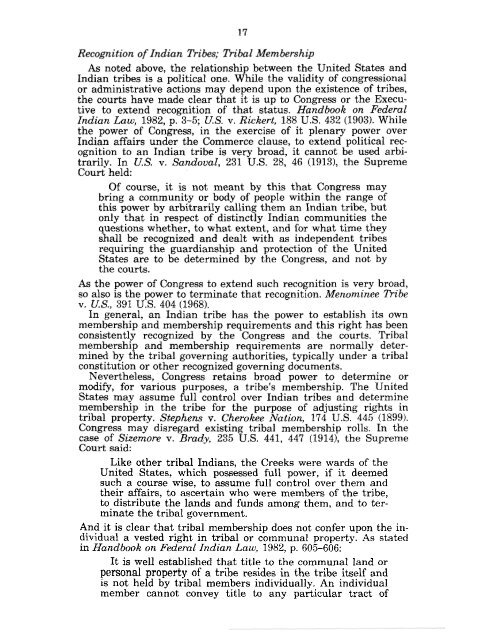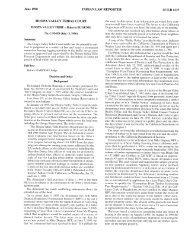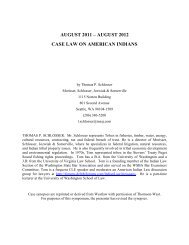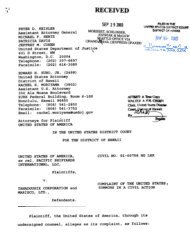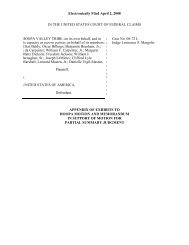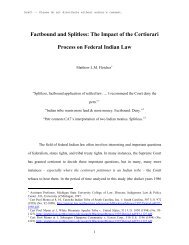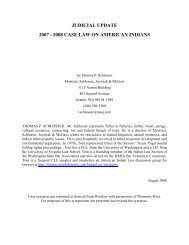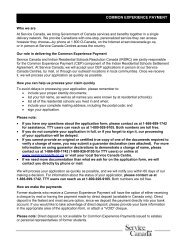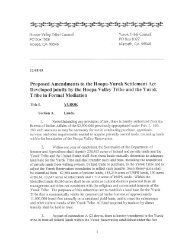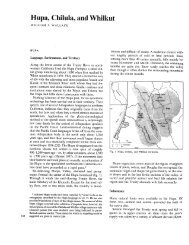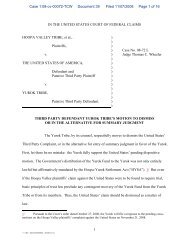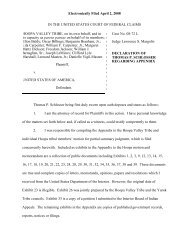16cifically denominated the Indian tribes or tribes for whose benefitthe reservation was established.In certain cases, particularly with respect to reservations establishedby executive order, the source authority does not designate aparticular tribe as the beneficiary of the reservations. In thosecases, discretion is left in the responsible executive official to laterdesignate the tribe or tribes to be settled on such reservation. Untilsuch official has acted under that discretion, no tribe is deemed settledon the reservation. In the December 16, 1882, Executive Orderestablishing a reservation for the Hopi Tribe, the language set thelands apart for the “Moqui (Hopi) and such other Indians as theSecretary of the Interior may see fit to settle thereon.” The Federalcourt found that the Secretary did not settle the Navajo Tribe onthat reservation until long after 1882.Whether the establishing instrument designates a trih or tribesas beneficiaries of the reservation or leaves to the discretion of anexecutive official the authority to later designate beneficiary tribes,in every case, the reservation is set aside for tribal or communalpurposes. Individuals have an interest in resources of the reservationonly insofar as they are members of the tribal entity for whosebenefit the reservation is set aside.Where the law creating an Indian reservation designates thetribe(s) for whose benefit the reservation is created and where it isclear that the reservation is intended for the permanent benefit ofsuch tribe, the beneficial interest in the reservation becomes vestedin that tribe and the power of Congress to deal with the property islimited. Congress, in the exercise of its plenary power over Indianaffairs, may modify or take the tribe’s property interest in suchreservation, Lone Wolf v. Hitchcock, 187 U.S. 553 (19031, but, indoing so, will be held to one of two standards.Congress may act as trustee for the benefit of the Indians and, ifit makes a good faith effort to replace the property taken withproperty of equal or nearly equal value, it will not be held to the5th Amendment standard. If it takes the tribe’s property for theUnited States or for others without making such good faith effort,such action will constitute a 5th Amendment taking. ShoshoneTribe v. US., 299 U.S. 476 (1937); Three Tribes of Fort Berthold Reservationv. US., 182 Ct. C1. 543 (1968); United States v. SiouxNation ofindians, 448 U.S. 371 (1980).In other cases, particularly with respect to executive order reservations,the law creating an Indian reservation may not designatethe tribe for whose benefit it is intended or, where discretion is leftto an executive official to so designate a tribe, that discretionaryauthority may not have been exercised or exhausted. In somecases, the law may not be clear that the reservation is intended forthe permanent benefit of Indians. In those cases, no right, asagainst the exercise of‘ the plenary power of Congress, has vested inany tribe and Congress may deal with that pmperty as it sees fitwithout subjecting the United States to a liability for an unconstitutionaltaking. Hynes v. Grirncs Packing Po., 337 1J.S 36 (1949);Healing v. Jones, 210 Fed. Supp. 125 (19621, affd. 373 US. 758.
17Recognition of Indian Tribes; Tribal MembershipAs noted above, the relationship between the United States andIndian tribes is a political one. While the validity of congressionalor administrative actions may depend upon the existence of tribes,the courts have made clear that it is up to Congress or the Executiveto extend recognition of that status. Handbook on FederalIndian <strong>Law</strong>, 1982, p. 3-5; US. v. Rickert, 188 U.S. 432 (1903). Whilethe power of Congress, in the exercise of it plenary power overIndian affairs under the Commerce clause, to extend political recognitionto an Indian tribe is very broad, it cannot be used arbitrarily.In US. v. Sandoval, 231 U.S. 28, 46 (19131, the SupremeCourt held:Of course, it is not meant by this that Congress maybring a community or body of people within the range ofthis power by arbitrarily calling them an Indian tribe, butonly that in respect of distinctly Indian communities thequestions whether, to what extent, and for what time theyshall be recognized and dealt with as independent tribesrequiring the guardianship and protection of the UnitedStates are to be determined by the Congress, and not bythe courts.As the power of Congress to extend such recognition is very broad,so also is the power to terminate that recognition. Menominee Tribev. US., 391 U.S. 404 (1968).In general, an Indian tribe has the power to establish its ownmembership and membership requirements and this right has beenconsistently recognized by the Congress and the courts. Tribalmembership and membership requirements are normally determinedby the tribal governing authorities, typically under a tribalconstitution or other recognized governing documents.Nevertheless, Congress retains broad power to determine ormodify, for various purposes, a tribe’s membership. The UnitedStates may assume full control over Indian tribes and determinemembership in the tribe for the purpose of adjusting rights intribal property. Stephens v. Cherokee Nation, 174 U.S. 445 (1899).Congress may disregard existing tribal membership rolls. In thecase of Sizemore v. Brady, 235 U.S. 441, 447 (19141, the SupremeCourt said:Like other tribal Indians, the Creeks were wards of theUnited States, which possessed full power, if it deemedsuch a course wise, to assume full control over them andtheir affairs, to ascertain who were members of the tribe,to distribute the lands and funds among them, and to terminatethe tribal government.And it is clear that tribal membership does not confer upon the individuala vested right in tribal or communal property. As statedin Handbook on Federal Indian <strong>Law</strong>, 1982, p. 605-606:It is well established that title to the communal land orpersonal property of a tribe resides in the tribe itself andis not held by tribal members individually. An individualmember cannot convey title to any particular tract of


